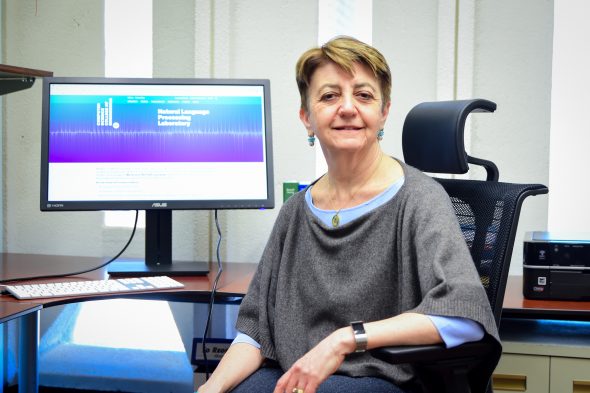University Scholar Barbara Di Eugenio
Barbara Di Eugenio
Professor of computer science
20 years at UIC
What are your research interests?
I am a computer scientist whose interests are Natural Language Processing (NLP) and Human Computer Interaction, as applied to educational technology, assistive robotics, intelligent interfaces and health care.
How did you become interested in these topics?
Many years ago, I did my undergraduate thesis on NLP in Italy. At the time, my choice was based both on what interested me, and which professors were approachable and had time to advise me. But I got hooked and never changed my general area of interest: I marvel at the complexity of human languages, the ability of humans to communicate, and the challenges of modeling all this via algorithms (procedures that a computer can execute). Even if approaches to NLP and its applications have changed a lot over the years, the marvel and the challenges are still there! It has been deeply rewarding to see the field mature and start having a real impact on society, including on health care, where NLP and Artificial Intelligence in general have started making a difference in the last five years or so.
What do you teach?
I regularly teach both technical electives and graduate courses in NLP (CS421, CS521 and seminars), and a Research Methods class for PhD students (CS590). Occasionally, I teach other classes in Artificial Intelligence. I am also a proud advisor of seven Ph.D. students, two master’s students, and two Honors College students. I was awarded the Teaching Recognition Program Award in 2014.
How do you balance teaching and research?
Ah, the million-dollar question. I am not sure I have found the right balance, even after 20 years. I try to prioritize and rank competing demands on my time, and I am for sure deadline driven; I try to block a small amount of time (like two/four hours per week) for writing. Over the years, I have also become better at saying “no” to requests that would not help me and/or my students thrive, or external requests (NSF panels, reviewing for conferences or journals) that fall during the semester. For sure summer, when I don’t teach, is key to devoting some uninterrupted time to research.
What’s your advice to students who want to focus their future careers on research?
I have been doing research for 30 years, and I still love it. When you do research, you keep growing and learning new things, either directly or vicariously (through my graduate students). And the other part of the advice is, never give up. I have had my share of rejections (publications and grant wise), but if you believe the idea is good and innovative, try again. Finally, you don’t need to go at it alone, not even as a Ph.D. student: you most likely are part of a lab or research group — learn from your fellow students, from your advisor and the other professors. All of my research is interdisciplinary, and that means I keep learning from other disciplines, from communication to nursing, from psychology to robotics.

